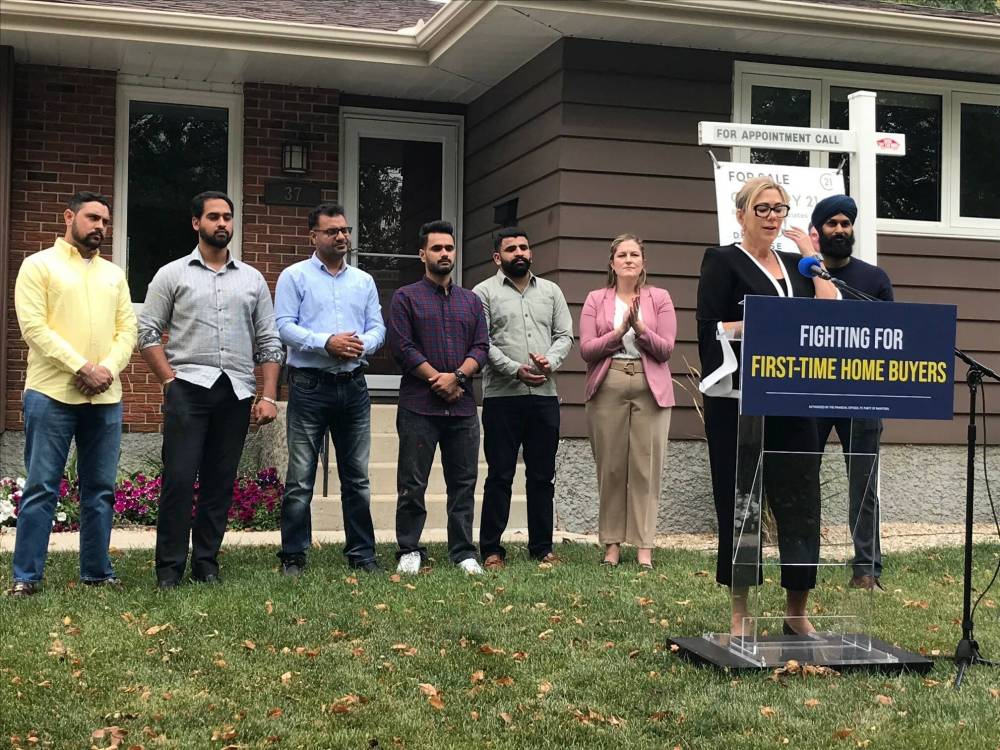Clinging to tax cuts risky strategy for Tories
Advertisement
Read this article for free:
or
Already have an account? Log in here »
To continue reading, please subscribe:
Monthly Digital Subscription
$0 for the first 4 weeks*
- Enjoy unlimited reading on winnipegfreepress.com
- Read the E-Edition, our digital replica newspaper
- Access News Break, our award-winning app
- Play interactive puzzles
*No charge for 4 weeks then price increases to the regular rate of $19.95 plus GST every four weeks. Offer available to new and qualified returning subscribers only. Cancel any time.
Monthly Digital Subscription
$4.99/week*
- Enjoy unlimited reading on winnipegfreepress.com
- Read the E-Edition, our digital replica newspaper
- Access News Break, our award-winning app
- Play interactive puzzles
*Billed as $19.95 plus GST every four weeks. Cancel any time.
To continue reading, please subscribe:
Add Free Press access to your Brandon Sun subscription for only an additional
$1 for the first 4 weeks*
*Your next subscription payment will increase by $1.00 and you will be charged $16.99 plus GST for four weeks. After four weeks, your payment will increase to $23.99 plus GST every four weeks.
Read unlimited articles for free today:
or
Already have an account? Log in here »
Hey there, time traveller!
This article was published 06/09/2023 (861 days ago), so information in it may no longer be current.
Can the promise of even more tax cuts help get the Manitoba Progressive Conservatives re-elected?
For years, the PC government has offered Manitobans tax cuts that currently cost the treasury more than a billion dollars per year in forgone revenue. For the most part, those tax savings have not curried a lot of favour with an electorate that is as concerned — if not more concerned — about the accompanying spending cuts or freeze to core services.
Undaunted by that political reality, PC Leader Heather Stefanson officially launched her party’s campaign this week with a promise to make life more affordable by cutting in half the lowest income-tax bracket over the next four years.

RUTH BONNEVILLE / WINNIPEG FREE PRESS FILES
PC Leader Heather Stefanson officially launched her party’s campaign this week with a promise to make life more affordable by cutting in half the lowest income-tax bracket over the next four years.
Stefanson claimed the income tax cuts alone would add up to an average of $1,900 savings, or “an extra paycheque for many Manitobans.”
There are two significant flaws in the Tories’ tax-cut narrative.
First, most Manitobans already know there is a huge collateral cost to all those tax cuts. Paying less tax means more disposable income — but it also means less money for health care, education, infrastructure and social services.
Stefanson has claimed she can cut taxes and protect services, but the last seven years of her PC government has shown the two cannot coexist.
The other major flaw is that the tax cuts offered by Stefanson in this campaign, and by her government during the last seven years, have only made life more affordable for people who could largely afford the cost of living. The hard numbers don’t lie: you need to be at or above average levels of income to garner any meaningful savings from the Tory tax cuts.
The hard numbers don’t lie: you need to be at or above average levels of income to garner any meaningful savings from the Tory tax cuts.
Since coming to power in 2016, the Progressive Conservatives have devoted more than $1.3 billion to annual tax cuts. Despite the impact that has had on government spending in priority program areas, Stefanson claimed the income tax cuts alone would save the average Manitoba family more than $1,000 on their 2023 tax return.
It didn’t take long for think tanks to punch a hole in those claims.
The Canadian Centre for Policy Alternatives’ analysis of tax cuts in the last Tory budget, using Statistics Canada tax modelling software, found the actual savings for all tax-filers was only $500, less than half of what the Tories had claimed. However, the term “average” really obscures the selective impact of these tax cuts.
The think tank found the top 10 per cent of tax-filers — people who earn more than $101,274 — were due to receive a $1,300 tax savings. Meanwhile, those at the bottom of the income ladder were only $74 to the better.
It’s the same for almost every one of the tax cuts the Tories have delivered or promised.
Eliminating the education portion of property taxes is worth thousands of dollars to those who own the biggest homes, but very little to those who own less valuable homes — and it is meaningless to renters.
The revelation of the lie in the tax-cut narrative has not, however, dampened Tory enthusiasm to double down in their 2023 re-election campaign.

WINNIPEG FREE PRESS
On Wednesday, Riel PC candidate Rochelle Squires and Burrows candidate Navraz Brar promised the Tories would eliminate the land transfer tax for first-time homebuyers.
On Wednesday, the Tories introduced yet another “affordability” measure, with a promise to eliminate the land transfer tax for first-time homebuyers. The Tories claimed the average savings would be $5,700. They did not acknowledge that it’s yet another pledge aimed at middle- and upper-income earners.
In short, to realize savings from the land transfer tax cut, you must have the financial means to qualify for and maintain a mortgage to buy that home. It is the essence of a campaign pledge that does nothing to help make life more affordable for the vast majority of Manitobans for whom affordability is a daily challenge.
For voters who truly see themselves as fiscal conservatives, giving away tax revenue– which is also used to pay down debt — is a dangerous policy.
Those are not, however, the only flaws associated with tax cuts. For voters who truly see themselves as fiscal conservatives, giving away tax revenue — which is also used to pay down debt — is a dangerous policy. Particularly when the global economy continues to teeter on the edge of a massive slowdown, inflation continues to ravage consumers and high interest rates threaten government finances.
An aggressive policy of tax cuts essentially requires a nearly perfect fiscal landscape in which the economy and gross domestic product are constantly growing, and there are no natural disasters or public health threats that require massive government spending. That is simply not the case currently.
Finally, let’s remember that a tax cut is, when all is said and done, no different than a spending pledge.
When a politician offers to cut taxes, they are promising to reduce the amount of money the government collects in revenue to spend on programs. It means a promise to spend more money on a program and a promise to collect less tax revenue have the same net impact on the budget’s bottom line.
At the outset of this campaign, the PC party has positioned itself as the only party willing to “fight for Manitobans.” So far, it has only established itself as the party fighting for middle- and upper-income Manitobans.
dan.lett@winnipegfreepress.com

Dan Lett is a columnist for the Free Press, providing opinion and commentary on politics in Winnipeg and beyond. Born and raised in Toronto, Dan joined the Free Press in 1986. Read more about Dan.
Dan’s columns are built on facts and reactions, but offer his personal views through arguments and analysis. The Free Press’ editing team reviews Dan’s columns before they are posted online or published in print — part of the our tradition, since 1872, of producing reliable independent journalism. Read more about Free Press’s history and mandate, and learn how our newsroom operates.
Our newsroom depends on a growing audience of readers to power our journalism. If you are not a paid reader, please consider becoming a subscriber.
Our newsroom depends on its audience of readers to power our journalism. Thank you for your support.











